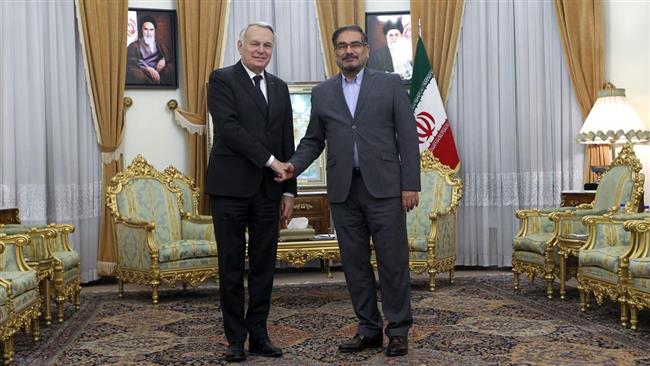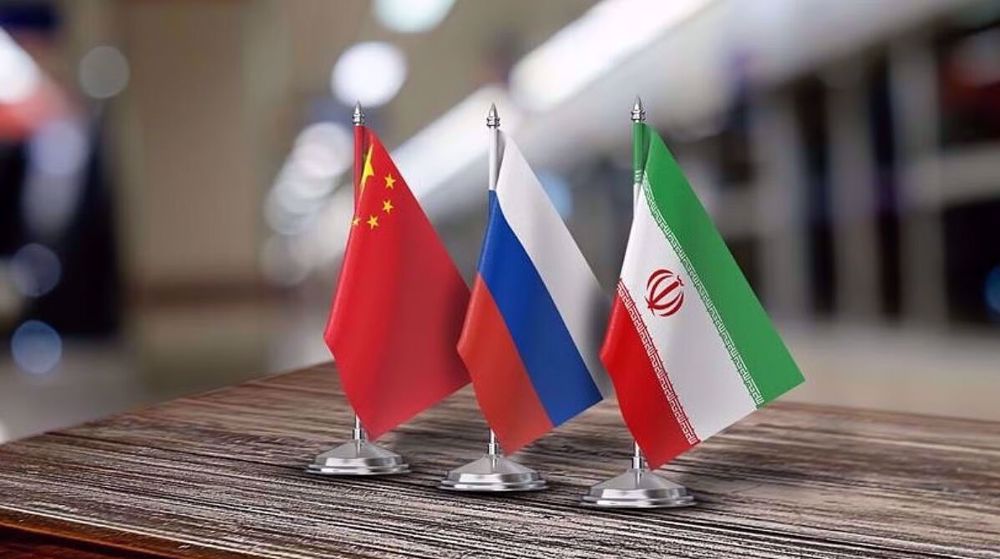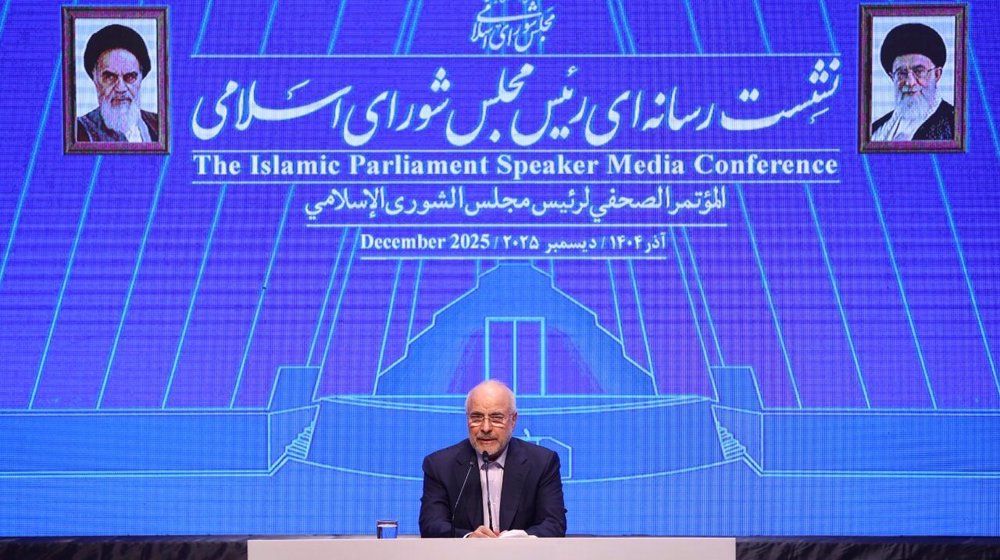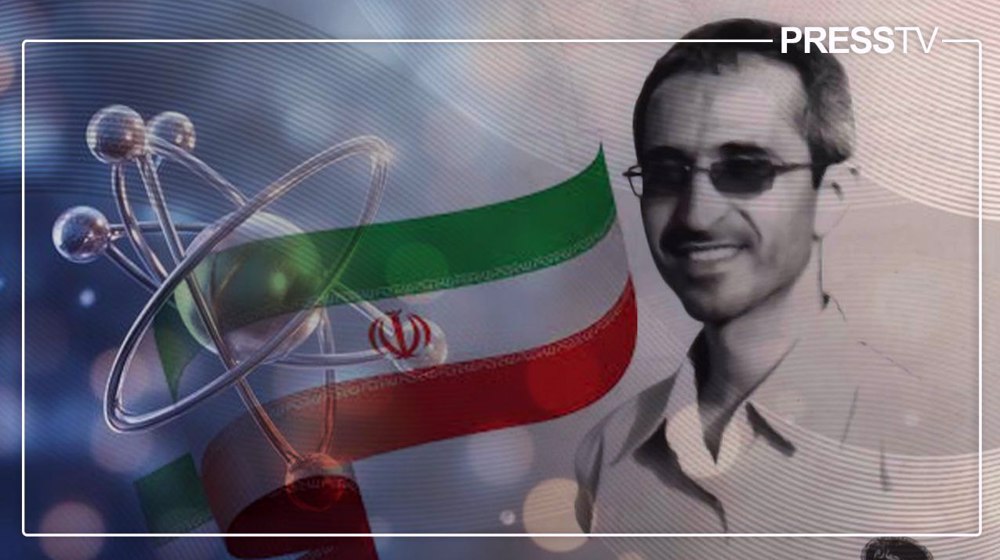All parties to nuclear deal must comply with commitments: Iran official
The secretary of Iran's Supreme National Security Council has underscored the need for the complete implementation of the landmark nuclear deal between Iran and six world powers, noting that all signatories must respect their obligations.
“The endurance of the JCPOA (Joint Comprehensive Plan of Action) is contingent upon the commitment of all parties to the fulfillment of [their] obligations. Drifting away from this process, based on any pretext and approach, will lead to a reciprocal measure,” Ali Shamkhani said in a Tuesday meeting with French Foreign Minister Jean-Marc Ayrault in Tehran.
Shamkhani hailed the boost in Tehran-Paris diplomatic and economic ties in the post-JCPOA era and stressed the need to expedite the removal of the existing obstacles, particularly with regard to banking transactions.
Heading a senior politico-economic delegation, the French foreign minister arrived in the Iranian capital on Monday for a two-day official visit.
Ayrault, for his part, expressed satisfaction over his meetings with Iranian officials and described the prospect of Tehran-Paris relations in the post-JCPOA era as highly promising.
He hailed Iran’s on-time implementation of its obligations under the nuclear deal and noted that the existing process will guarantee the two countries’ interests in different political and economic spheres.
Upon his arrival in Tehran, Ayrault told reporters that he had traveled to Iran as a “defender” of the nuclear deal, amid concerns that the US may scrap it.
France was one of the six countries that, with European Union (EU) coordination, negotiated the deal with Iran. Although France on several occasions adopted a hard line against Iran during the course of the negotiations, giving the impression that it was putting diplomatic attempts for a deal in jeopardy, Paris has been a staunch supporter of the agreement since its signing in July 2015.
Under the JCPOA, all nuclear-related sanctions on Iran were terminated, and Iran in return agreed to apply certain limits to its nuclear program and provide enhanced access to international monitors to its nuclear facilities.
But there has been concern recently that the US, under President Donald Trump, would violate the deal or stop implementing Washington's commitments under the accord altogether. A self-admitted non-politician, Trump had previously threatened to rip up the deal and called it “the worst accord ever” and “one of the dumbest” ones he had come across.
On Saturday, French President Francois Hollande said he had warned Trump to respect the historic nuclear deal between Iran and the P5+1 group of countries.
Read more:
- Ayrault in Iran: I come as defender of N-deal
- All JCPOA signatories must remain committed to obligations: Rouhani
- France in strong show of support for Iran ties
Anti-Terror campaign
Also at the meeting, Shamkhani pointed to the terrorists attacks in France over the past two years which have claimed the lives of several French citizens and underscored the need for an all-out campaign against terrorism.
“Adopting double standards in fighting terrorism and dividing terrorism into good and bad, leads nowhere but to the spread of the wave of violence and crime,” he added.
Shamkhani criticized Paris for allowing the terrorist Mujahedin-e Khalq Organization (MKO) to be freely active in France, despite the group’s terrorist actions against the Iranian citizens and officials and its cooperation with the former Iraqi dictator, Saddam Hussein, during the eight-year Iran-Iraq war in the 1980s.
“Any support for this terrorist group will send non-friendly messages to the Islamic Republic of Iran,” he noted.

The terrorist group had to flee Iran shortly after the Islamic Revolution in 1979 after carrying out a spate of assassinations and bombings which took the lives of many top officials and civilians.
The MKO is listed as a terrorist organization by much of the international community and has committed numerous terrorist acts against Iranians and Iraqis.
Political Solutions key to Syrian crisis
Elsewhere in his remarks, Shamkhani elaborated on the ongoing cooperation among Iran, Russia and Turkey to set out a political framework to resolve the Syrian crisis and noted that the efforts have led to the most successful ceasefire and direct dialogue between Damascus and the foreign-backed armed opposition groups over the past six years.
“Political solution and dialogue should be considered as the unavoidable strategy to resolve the regional crises and it should replace use of terrorism as a tool to meet political ends,” he added.
Last week, Syria’s warring sides held direct talks in Astana, Kazakhstan, with the mediation of Iran, Russia and Turkey.
At the end of Astana talks on January 26, Iran, Russia and Turkey agreed on the establishment of a trilateral mechanism to support the ceasefire in Syria and monitor possible violations.
VIDEO | Press TV's news headlines
Iran, Russia stress strategic partnership as Pezeshkian, Putin meet
Iran stresses need for trust, solidarity among world’s nations
Israel admits it inflicted less damage to Iran than initially thought
VIDEO | Venezuela condemns US seizure of oil tanker
VIDEO | Iran, Africa strengthen scientific, health ties
Iran slams powers for granting Israel ‘special right’ for aggression
‘Act of state piracy’: Iran blasts illegal US seizure of Venezuelan oil tanker










 This makes it easy to access the Press TV website
This makes it easy to access the Press TV website